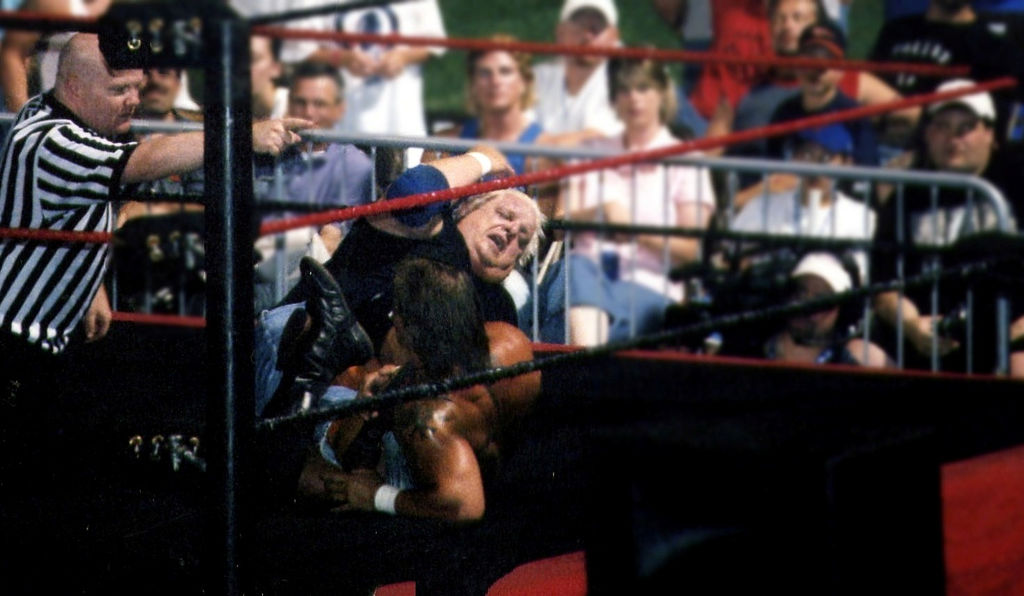The first thing you notice about the Socialist Alternative-led protest against cuts to Arts majors is that none of its speakers, despite their presumed experience, know how to cut a promo.
In wrestling parlance, a promo is basically anything the wrestler does outside of the ring to forward a storyline. It gives context to the action: it’s why wrestling is called “sports entertainment” rather than sport. Nobody cares that wrestling is scripted: through promos, wrestling instead is “the great spectacle of Suffering, Defeat and Justice” that Barthes describes it as.
The greatest promo of all time is Dusty Rhodes’ “Hard Times”. Dusty Rhodes, the “American Dream”, looks nothing like what we think of as a wrestler. He lacks the steroided physique of Hulk Hogan, or the in-ring agility of his opponent, Ric Flair. He has a bleach-blonde permed mullet and wears a grey suit jacket with a vest and pink shirt. The shirt is too small for him and his tie clashes horribly. He looks like the stereotypical customer at Wal-Mart that we so like to laugh at, a nameless, overweight, undereducated American.
But this is exactly what sells “Hard Times”. In a fever, with a declamatory tone not often heard outside Assembly of God churches, Dusty talks about Ric Flair having put hard times on the country through his defeat and injury of Rhodes. He notes that his looks are atypical; that he isn’t what one would expect of a wrestler, but despite this, he has the strength to defeat Flair. He’s bad. Rhodes here is a babyface, a good guy, a man of the people. His hard times are “when a man has worked a job for thirty years, thirty years, and they give him a watch, kick him in the butt and say, ‘hey, a computer took your place, daddy’”. It holds a universal appeal; anyone can feel like they’re going through hard times impressed upon them from the outside, regardless of their station in life.
In ‘Us vs. Them’, an article on Grantland, the Masked Man illustrates how this underlines all of wrestling’s face vs. heel (bad guy) conflict. The heel will always be Them, and aligned with Them. But the success of wrestling is not just about building a Them; it’s about building an Us. Which is precisely why the Socialist Alternative protest yesterday over proposed Arts major cuts failed (and fails) to capture hearts and minds of students. For all their work to make VC Paul Johnson into a moustache-twirling heel, without building a coherent progressive platform – an Us – support ebbs away, much like the members of faculty who left as soon as the slogans started.
The complete indifference of a gaggle of marketing students, waiting for an exam alongside the protest, is telling. There was – and is – nothing said to make them feel the impact of these hard times. Arts students are seen as dispensable and irrelevant, and we certainly don’t make it easy for ourselves (we do, after all, rambling diatribes that make tenuous links between wrestling and student protests).
In “The Great Right Moving Show”, Stuart Hall talks of how Thatcherism was entirely successful in changing the discourse around social issues so that the Labor party is and was seen to have “interfered, meddled, intervened, instructed, and directed – against the essence, the Genius, of The British People”. And in much the same way, Arts students, particularly Gender Studies and MEMS students, are positioned as self-indulgent, ivory tower types, a kind of self-fulfilling prophecy of navel-gazing. We are part of a power bloc of liberal intelligentsia, leeching off the taxpayer dollar, cast in the War of Position in opposition to the every man, the people, Us.
But the Hard Times, guided by ruthless neoliberalism, will visit all students, of every stripe – through increasing class sizes, fewer resources, a lower quality of teaching, and ultimately the reduction of institutes of learning to degree farms that produce more efficient workers instead of more learned people.
I don’t ever expect to convince a business student of the virtue of MEMS, even with Game of Thrones being as successful as it is. But I can talk to them about Hard Times.
Words by Sean McEwan

